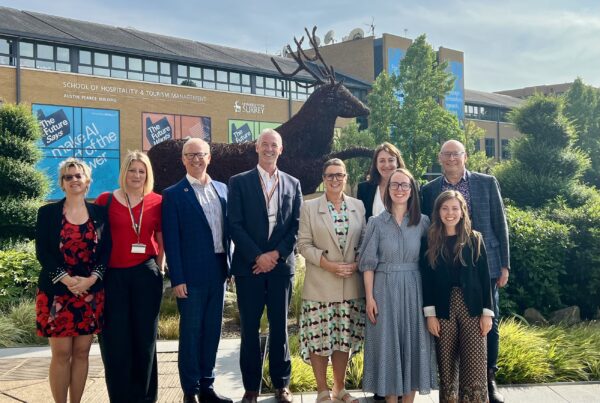Now feels like a time of flux and re-examination of purpose in global universities. In the US, national political moves towards university loan forgiveness is occurring as fees rise, enrolments fall and the value of higher education is questioned. And adding to these challenges are cost of living rises not seen for decades, and national life expectancy falling for the first time outside of world wars.
And yet, the number of students studying in US universities now, compared to the last world war, is fundamentally changed. Some institutions more than others have embraced the need for scaling up and being inclusive in their mission.
The UK is in a time of social change more broadly. The latest new PM is the 4th in 6 years, while the first new head of state for 70 years adds to the uncertainties of Brexit. This is affecting universities that are under ever-growing pressure to fund research and demonstrate relevance.
Their need to provide opportunity to under-represented students has been made more difficult for a population whose personal ability to access life-changing higher education is compromised due to the worsening economic environment. When the choices sharpen around being able to heat or eat, choosing to learn for 3 years at your own expense becomes challenging.
As HEPI recently observed, there were 18 UK universities when Queen Elizabeth commenced her reign. They form the core of what is now known as the Russel Group. UCL as the UK’s largest university now has over 6,000 full time academic staff which is not far off the sector total from 1952. There are more than 150,000 now employed in the wider sector, supporting 2.2 million students compared to 85,000 some 70 years ago.
But how can all the 145 current UK universities scale up and develop an inclusive approach to under-represented students? Location is key to many variations, while history and reputation also create a platform for differentiated strategic responses.
In Australia we have seen a similar expansion in student numbers. The number of universities beyond the founding Group of 8, and the number of sector staff and participation rates, have all grown significantly. But the rate of expansion, mission, and approaches to equitable access and inclusion might be one way that our universities do differ and have potential to differentiate further, while all serving a common purpose aligned with the emerging and prevailing national needs linked to the political climate.
In the US, one of the most distinct approaches to scaling up and inclusivity has been Arizona State University. Its growth to more than 150,000 students is enabled by some of the most advanced and developed online learning platforms, formed over an extended period, and in partnership with a more mature Edtech ecosystem.
But it is combined with the most innovative employer partnerships providing corporate scholarships, for instance, to all US Starbucks employees and Uber contractors. The fact that the ASU student body is now identical in its demographic to the surrounding population more broadly is one great indication of success, alongside it being voted the most innovative US university now 8 years running.
In the UK, beyond the growth of UCL, distinct efforts by local providers in pathway programs and widening participation have been particularly influential in growing numbers from under-represented students.
Coventry University has been notable among them and is described as the fastest-growing UK university and one of the highest ranked modern universities, with a distinguishing focus on the student experience.
The University of Surrey is a top-20 ranked UK university outside of the Russel Group that has rapidly raised its research profile, with a strong emphasis on impact. But Surrey also has a clear focus on student experience and engagement and prides itself on its top ten rating for student satisfaction and being UK University of the Year for employability in 2022.
Its other achievements and points of difference include strong engagement with industry and businesses with the 2nd largest research park in the UK hosting over 170 companies. Surrey’s Professional Training Year has been highly successful in preparing graduates for jobs and leadership, as Max Lu articulated in his recent blog.
In a climate of skills shortage and economic austerity, Surrey has now launched a philanthropic campaign to raise funds for student scholarships to allow more under-represented students to benefit from a university education. Max Lu would argue that doing so is emerging as a real opportunity to differentiate in a highly competitive university environment. We shared this and other Surrey stories on a HEDx podcast you can access here.
Inclusion is emerging as the prevailing sector focus in Australia in our own economic challenges. It is the dominant response to emerging policy priorities that follow the appointment of our 4th PM in 7 years and 7th in 15.
We too have had 70 years of continuity in our head of state and constitutional oversight, but there are undoubted moves for change and broader inclusivity in our governance. There is also an urgent need for us to source students to be supported to succeed in studies, from a broader range of under-represented groups, if we are to meet acute jobs and skills shortages.
This has become the clear priority following the first 100 days of a new Albanese government and the jobs and skills summit that accompanied that landmark. This invites all Australian universities to find their potentially differentiated paths to fulfilling national and societal priorities in what is emerging as the only game in town.
We have our own different context for how that game will play out in our realm, with philanthropic fundraising for equity scholarships an option for all. This is a particular point of focus for the Universities of Queensland and Sydney in their 10-year strategic plans.
But our geography is such that skills shortages and inequities in economic circumstance, between cities and regions, provide strong incentives for regional universities. They typically have outstanding graduate employment records, including Charles Sturt University ranking number one for graduate employment in the new Good Universities Guide.
If we are going to transform equity of opportunity in regional Australia and serve the jobs and skills shortage at their most acute, particular strategies for our regional universities connected to community engagement and local support from employers appear obvious.
And with our strong traditions in remote learning and opportunities becoming available through digital transformation and new approaches to hybrid learning, who might strike out to truly differentiate in providing equitable and inclusive access to remote learners in all parts of Australia and globally?
There are a great post-pandemic range of opportunities opening up to all Australian universities to make their mark on the world stage, just like others have done from the US and UK, in seizing the need for and mood of change from their own particular vantage point.
First published in Campus Review on 27th September 2022
Emeritus Professor Martin Betts, Co-Founder of HEDx
Professor Max Lu is VC of Surrey University in the UK









